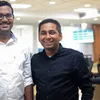This 25-year-old’s bootstrapped startup wants to lessen the woes of medical tourists
Gurugram-based startup Avocure offers end-to-end assistance to patients travelling for their medical and wellness needs.
Nearly 150,000 patients from all over the world travel to India every year seeking medical treatment, says a report by the Ministry of Tourism. While the patients and their caretakers are worried about the outcome of the treatment and other issues such as cost, being misguided by translators in the name of medical tourism is only adding to their woes.
To solve this problem, IIT-Guwahati alumnus Harmeet Singh started Avocure in 2017. It is a medical travel startup that aims to connect patients from across the world with local hospitals. The Gurugram-based startup also helps patients get a second opinion from expert doctors across the globe.

Team Avocure has collaborated with more than 150 high quality hospitals in India.
On what led him to start up, Harmeet says,
“There are several patients who travel from Afghanistan to Delhi for treatment, and so I decided to make Delhi as the focus area for my research. During my research, it was clear how the translators were exploiting these patients coming to India for their treatment. These intermediaries who had no medical background were recommending options for treatment.”
Today, Avocure has collaborated with more than 150 high quality hospitals in India, like Medanta Medcity, Apollo Hospitals, and Max Healthcare, and a few hospitals in the Middle East, France, Tunisia, Morocco, Turkey, etc.
Looking past healthy competition
With competitors like Vaidam, Hospals, HBG Mediconnect India, IndiCure, and Clinicspots in the Indian market, Harmeet believes Avocure has an edge as it is completely tech-driven.
All the patient has to do is log on to the Avocure website, explore the options available for treatment, and search for their medical condition. If the patient is unsure about the condition, a video consultation is arranged for them, following which, the patient can select a few hospitals (local/overseas), according to their preferences, and raise a query. After this, a detailed treatment plan with cost estimates from the providers appear for easy comparison.
Once the patient finalises on the provider, the latter is informed through the platform. A medical visa is then processed by the provider for the patient based on the appointment dates. A point-of-contact is also made available for each patient.
“One of the major advantages of using our dashboard is that we have the best turnaround time (TAT) in the industry. We provide a treatment plan from the hospital within three-to-four hours as compared to 24-48 hours TAT of other medical travel service providers. We even go the extra mile and provide free online consultation for patients as well,” says Harmeet.
Challenges with starting up
Being a B2B company and a new player in the market, one of the initial challenges for the startup was when few hospitals bypassed them and approached the patients directly.
“In that case, if at all the patient does not receive the quality services we market (not the medical treatment), our brand gets tarnished. It is a problem we have had to work around,” he says.
Another major challenge was that of illegal translators/tarjuman. Avocure noticed there were some translators stationed at the Delhi airport who were influencing the patients as soon as they arrived. It had reached a saturation point. However, the patients became aware of such illegal practices, and how money was being extracted from them.
Another challenge too hand a bit of a translation issue:
“When it came to operations, we had initial hiccups with patients from the Middle East as most of them speak only in Arabic.”
Numbers and collaboration
Avocure claims to have a well-instructed platform to make the patients’ experience better. At present, some of Avocure’s key markets include Afghanistan, Oman, Saudi Arabia, the UAE, Qatar, Kuwait, Tanzania, Nigeria, Kenya, Cameroon, Congo, Ghana, Ivory Coast, and Zimbabwe.
The startup has also formed partnerships with travel management companies such as Akbar Travels and Satguru Travels, and has spread to over 60 countries in Africa, the Middle East, and Europe within two years.
“As per information published by OECD, patients in the US save between 30 and 50 percent of the cost of treatment for common ailments such as heart issues if they travel to Asia or Latin America for the same treatment. A heart surgery in the US will cost approximately $140,000. However, the same procedure in a super-speciality hospital like Medanta Medcity in Gurugram will cost approximately $7,000,” says Harmeet.
According to Harmeet, what makes their startup stand apart is that they are the first medical travel company in the world to tie up with the Ministry of Public Health in Afghanistan.
Harmeet says, “Instead of encouraging the patients to fly out of their homeland to an unknown location overseas, we instead insist on promoting and finding cure at the local hospital itself and only once the treatment is unavailable locally, we provide international options for patients.”
The medical tourism market and future
According to the Ministry of Tourism, India, the medical tourism market in India will be $9 billion by the end of next year. India has also been ranked the third most popular destination for medical tourism.
According to Reportlinker, the global medical tourism market was valued at $53,768 million in 2017, and is estimated to reach at $143,461 million by 2025, registering a CAGR of 12.9 percent from 2018 to 2025.
The team claims to have dealt with over 1,200 patients since its inception and has an active user traffic of 7,600 visitors in a month.
“We do not charge any fees from the patients for the services we provide. However, we charge ‘market development fee’ from the hospitals for marketing their hospitals and features on our website,” says Harmeet.
Bootstrapped Avocure has invested around Rs 65 lakh in the company since its inception. The startup has seen revenues of nearly Rs 70 lakh so far, and aims to achieve a gross revenue of Rs 10 crore by 2020, with an approximate profit of Rs 1 crore to Rs 2 crore. The five-member team, however, refused to share how much it charges its patients.
Speaking of their future plans, Harmeet says,
“We are extending the capabilities of our platform and operations to support easy and affordable tele consultation for our demographics, alongside physical support centres that are in reach with patients in a particular region. This will help us simplify and manage the end-to-end flow for patients (medical travellers), right from initial opinions till rehab and follow-ups. We are actively looking for investors for early stage funding to expand our team, to invest in resource intensive marketing activities, and scale our operations quickly.”
Edited by Megha Reddy




1564143693581.png?fm=png&auto=format&h=100&w=100&crop=entropy&fit=crop)



